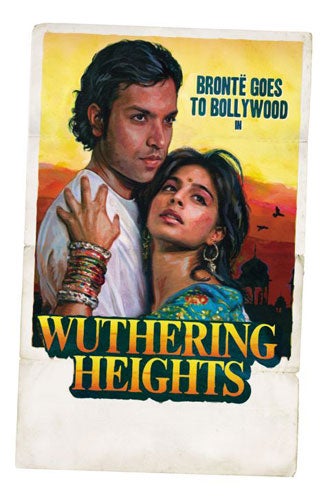Brontë gets the Bollywood treatment
Rajasthan replaces Yorkshire as the setting for new version of 'Wuthering Heights'

It has all the ingredients for the perfect Bollywood drama: sweeping landscapes, a tortured hero, a long-suffering heroine and an unrequited love story with tragic consequences – Emily Brontë's Wuthering Heights is about to get a Bollywood makeover.
The acclaimed writer Deepak Verma has put the finishing touches to a musical version of the novel, transposing the quintessentially Yorkshire love tale to the deserts of Rajasthan and swapping Victorian snobbery for India's strict caste system.
The play will be set to Bollywood-style music but will broadly follow the plot of the 1847 novel, which recounts how the tormented foundling Heathcliff fell in love with Catherine, the daughter of the kindly benefactor who took him off the streets of Liverpool.
The brooding figure of Heathcliff is replaced by Krishan, a low-caste street urchin who is adopted by a kindly merchant and falls in love with his headstrong daughter Shakuntala.
Verma, one of the first British-Asian actors to become a household name in the UK when he played Sanjay in EastEnders, said he always thought that the novel lended itself to a Bollywood makeover.
"Marrying Wuthering Heights to Bollywood just seemed like the obvious thing to do," he said. "Everything about it suits Bollywood – a tragic love story set in a beautiful and harsh environment. It's perfect." Casting for the 12 roles has already begun and the production will tour the UK next spring.
The Tamasha Theatre Company, a charity set up in 1989 to bring British-Asian work to the stage, is producing the play. Tamasha has helped launch the careers of some of the most successful British-Asian performers.
Parminder Nagra, best known for playing Neela in the American TV drama ER, received her break through Tamasha after she was spotted on stage by the director Gurinder Chadha and cast alongside Keira Knightley in the 2002 hit Bend It Like Beckham.
Tamasha, which means "commotion" in Hindi, also staged and funded the original stage version of Ayub Khan-Din's East is East, a heartwarming tale of a mixed-race family growing up in 1970s Salford. Buoyed by its success on stage, the film adaptation of Khan-Din's play went on to gross £10m in the cinemas despite costing just £1.9m to make.
The company's most recent production, Sweet Cider, addressed a darker aspect of Asian life in Britain, telling the story of two girls who fled their families, met in a women's refuge and struggled to cope with the terrifying lack of family ties their newfound freedom had earned them.
Kristine Landon-Smith, who set up Tamasha with the playwright Sudha Bhuchar, said of Wuthering Heights: "This production will go up to the death of Catherine's character. It's the perfect Bollywood tragedy with epic landscapes and epic characters. The hierarchical structure of Victorian society translates very well into the same era in Rajasthan."
Andrew McCarthy, who runs the Brontë Parsonage Museum in Haworth, near Bradford, said Wuthering Heights could easily be adapted to different locations and cultures. "I think it's a wonderful idea," he said.
He hoped a Bollywood version of the novel would help open up new audiences to Brontë's classic work.
Eastern epics: Bollywood remakes
*Sholay (1975)
Sholay drew heavily on the 1960 western The Magnificent Seven, itself a remake of the Japanese classic Shichinin no samurai (Seven Samurai). Billed as "The Greatest Story Ever Told" it managed to live up to its own hype by becoming India's highest-grossing film, earning the equivalent of $60m. It was initially a commercial flop, but word of mouth drove up audiences.
*Bride and Prejudice (2004)
Directed by Gurinder Chadha, the writer/director of Bend It Like Beckham, and starring Aishwarya Rai, centre, this adaptation of the Jane Austen classic was a success, despite mixed reviews from critics who said it was a poor interpretation.
*Black (2005)
Selected by Time magazine (Europe) as fifth of the "10 Best Movies of 2005", this movie was partly based on Arthur Penn's 1962 biographical film of Helen Keller, The Miracle Worker. Starring Amitabh Bachchan and Rani Mukherjee, the film won 11 Filmfare Awards.
Join our commenting forum
Join thought-provoking conversations, follow other Independent readers and see their replies
Comments